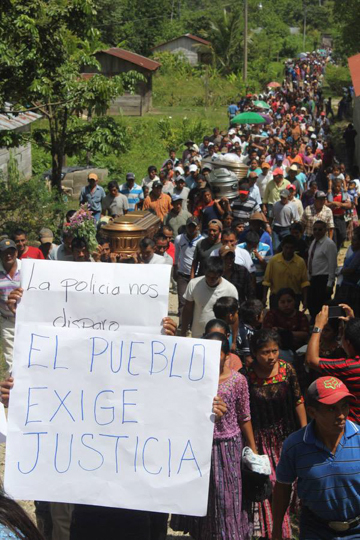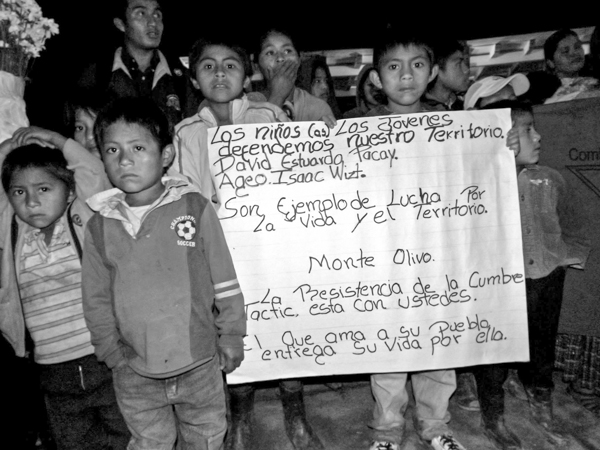In October, the private sector lending arm of the World Bank Group (International Finance Corporation, IFC) confirmed the cancellation of a controversial Santa Rita hydroelectric project in Guatemala, approved under the UN’s carbon offsetting scheme Clean Development Mechanism (CDM). The announcement follows a report by the IFC Ombudsman which found serious failings in the project planning, and the withdrawal of support by the Dutch Development Bank (FMO). Carbon Market Watch welcomes the closure to a long process that saw violent clashes as a result of human rights violations, and calls to ensure that future climate mitigation projects respect human rights.

The hydroelectric dam Santa Rita was to be built in the Alta Verapaz region in Guatemala with the financial support of a private equity fund backed by bilateral and multilateral institutions such as the German and Dutch development banks (DEG and FMO), the World Bank’s International Finance Corporation (IFC) and the Spanish Agency for International Cooperation (AECID).
Deadly protests
Since its beginning in 2010, the hydro dam project faced fierce opposition from affected indigenous communities whose rights to free, prior and informed consent were violated, and whose access to water and adequate food would have been at risk had the project gone forward.
Consequently, Santa Rita was at the center of a violent conflict between the communities and the project developer, with dramatic consequences: since 2010, seven people have been killed, including two children in 2013, forcing the project developer to stop the construction of the dam.
CDM registration despite concerns of human rights violations
Together with organisations representing the locally affected communities and Members of the European Parliament, Carbon Market Watch has campaigned against a registration of the project under the UNFCCC’s Clean Development Mechanism (CDM) since 2013.
As a result of the pressure from civil society and European lawmakers, Santa Rita was the first project that was officially reviewed by the CDM Board upon concerns on how the consultation was conducted. This led the Board to amend its rules in order to require the local stakeholder consultation to comply with national legislation. Regardless of these steps, however, the Board approved Santa Rita’s CDM registration in July 2014.
Vice President of the European Parliament Heidi Hautala welcomed the recent developments: “A lot of work has been put into bringing these flaws to the attention of the UN’s Clean Development Mechanism Board. Paris Climate Agreement states that climate action needs to respect, promote and consider obligations on human rights. It is of paramount importance that this is implemented. Human rights should be an integral part of any climate projects’ impact assessment from the very start: there is no sustainability unless human rights are respected. In Santa Rita there were grave shortcomings in the process. Hopefully, from now on we start seeing human rights impact assessments as an integral part of the planning phase of any UN climate action project.”
Shortcomings acknowledged

In reaction to the CDM registration, local organisations filed an official complaint to the Compliance Advisor Ombudsman (CAO), an independent recourse mechanism for the International Finance Corporation (IFC) of the World Bank Group, highlighting the project’s shortcomings and the inconsistency with several of the IFC’s Performance Standards.
Late October 2017, CAO published the conclusions of its investigation and found that “IFC’s review overlooked weaknesses in the environmental and social due diligence […].” Key shortcomings include “gaps in the environmental assessment information”; a “lack of a social impact assessment”; “inadequate analysis of the project’s expected impacts on biodiversity, land use, drinking water, livelihoods, and cultural heritage; and a “lack of an assessment of whether the fund met […] the requirement for Free Prior Informed Consent”.
Withdrawal of financial support of the project
In its response, the IFC clarified that “the Client made the decision not to proceed with the Project”. Dutch national development Bank (FMO) also stated that it “has exited its direct shareholding investment in the project”.
Maximo Ba Tiul, spokesperson of the Consejo en Resistencia Sierra de las Minas, one of the complaining organisations representing the affected stakeholders, welcomed CAO’s conclusions and FMO’s reaction, saying that both news “brought hope to the communities that resist the extractivist development model”. M. Ba Tiul further calls on the Guatemalan government to take the report into account and initiate redress measures for the affected communities.
The recent developments took place right before the 23rd UN climate change conference, where countries met to discuss how the successor of the CDM, the Sustainable Development Mechanism, should work in practice. Carbon Market Watch calls on countries to draw lessons from Santa Rita, and other controversial CDM projects, to guarantee that human rights and sustainable development are at the core of any future multilateral climate cooperation and ensure safeguards are in place that prevent mitigation projects from violating human rights or causing environmental harm.






